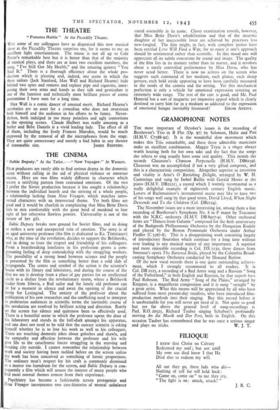THE CINEMA
" Baltic Deputy." At the Tatter.!' Now Voyager." At Warners.
FILM producers are rarely able to find serious drama in the domestic scene without calling in the aid of physical violence or amorous excess. Here are two films widely different in character which weave a satisfying pattern from restrained emotions. Of the two I prefer the Soviet production because it has sought a relationship between the individual hearth and the striving of a whole people, a relationship lacking from Now Voyager, which matches intro- verted characters with an introverted theme. Yet both films are good and it would be churlish in complaining that Miss Bette Davis fails to mix comfortably with the great herd of mankind to lose sight of her otherwise flawless powers. Universality is not of the nature of her gift.
Baltic Deputy breaks new ground for Soviet films, and in doing so strikes a new and unexpected vein of emotion. The story is of an aged university professor (the film is dedicated to Ka. Timiriazev) who, at the time of the revolution, decides to support the Bolsheviks, and in doing so loses the respect and friendship of his colleagues. From a heartbreaking loneliness in his profession grows a com- pensating feeling of deep comradeship with the struggling workers. The possibility of a strong bond between science and the people is presented by the film as something better than a cold slab of propaganda. The centre and symbol of the action is the scientist's house with its library and laboratory, and during the course of the film we see it develop from a place of gay parties for an intellectual circle to a shelter from the revolutionary storm, where a Bolshevik leader from Siberia, a Red sailor and the lonely old professor can sit for a moment in silence and await the opening of the crucial battle for Leningrad. The anxiety of the professor about the publication of his new researches and the conflicting need to interpret to proletarian audiences in scientific terms the inevitable course of the revolution are resolved by brilliant acting and direction. Rarely on the screen has silence and quietness been so effectively used. There is a beautiful scene in which the professor opens the door of his laboratory and stands in the half-dark amongst his apparatus, and one does not need to be told that the outcast scientist is asking himself whether he is to lose his work as well as his colleagues. There are touching domestic jokes about goloshes and shawls, and the sympathy and affection between the professor and his wife give life to the cataclysmic forces struggling in the starving and freezing city outside. I cannot remember the relationship between work and society having been tackled before on the screen unless the work has been conceived as something of heroic proportions. The ordinary man's respect for his craft is commonly dismissed as a matter too humdrum for the screen, and Baltic Deputy is con- sequently a film which will arouse the interest of many people who find most normal themes remote from their experience.
Psychiatry has become a fashionable screen protagonist and Now Voyager incorporates two case-histories of mental unbalance cured ostensibly in its name. Closer examination reveals, however, that Miss Bette Davis's rehabilitation and that of the neurotic daughter of her inaccessible lover are achieved by processes less new-fangled. The film might, in fact, with complete justice have been entitled Love Will Find a Way, for to enjoy it one's approach should be sentimental rather than scientific. In this mood one will appreciate all its subtle evocations by sound and image. The quality of the film lies in its manner rather than its matter, and it revolves about a surely controlled performance by Miss Davis, who has never acted better. There is now no actress on the screen who suggests such command of her medium, each glance, each sharp gesture, each bold stride appearing to have been carefully measured to the needs of the camera and the setting. Yet this mechanical perfection is only a vehicle for emotional expression covering an extremely wide range. The rest of the cast is good, and Mr. Paul Henreid has a sort of magnetic yet impassive appeal which is dearly destined to carry him far in a medium so addicted to the expression
of emotional hunger inevitably frustrated ! EDGAR ANSTEY.


























 Previous page
Previous page